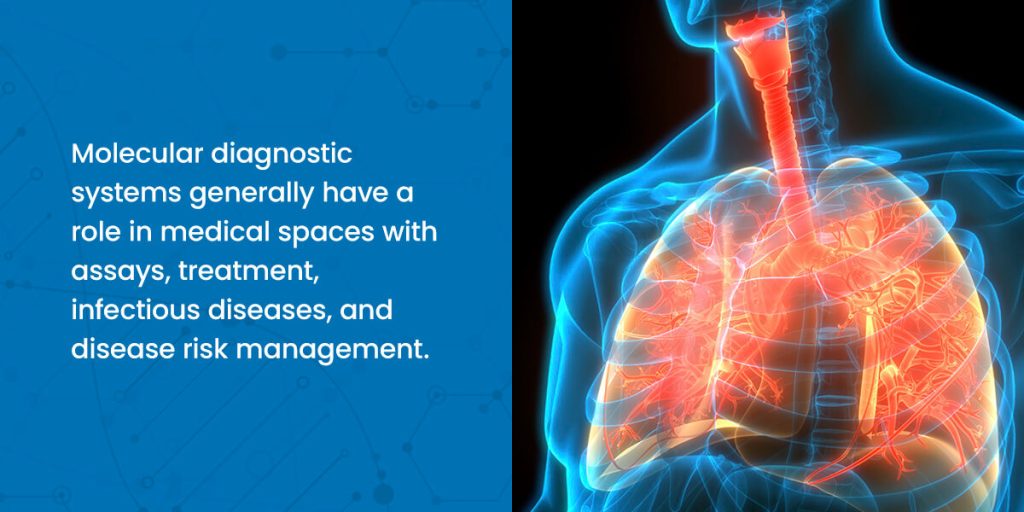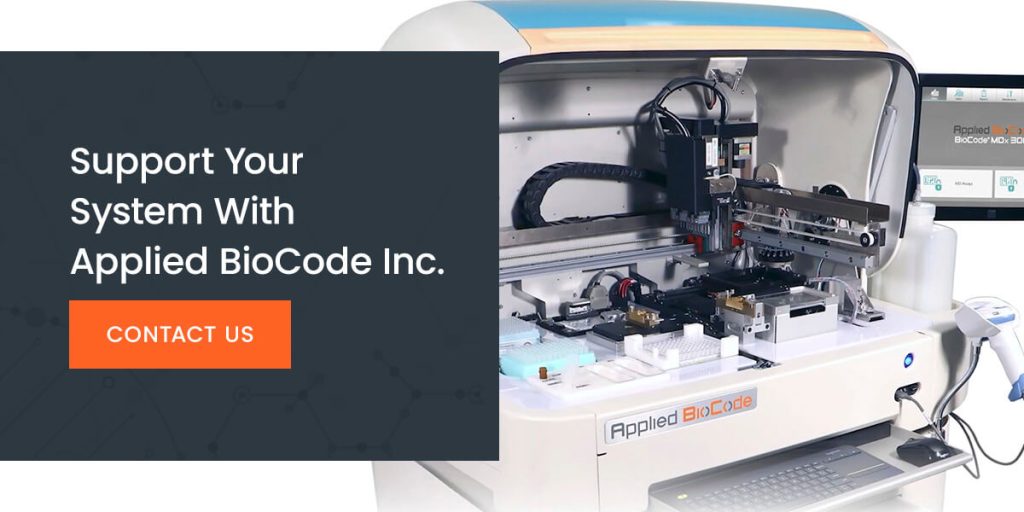Table of Contents
- What Is the Definition of Molecular Diagnostics?
- The History of Molecular Diagnostics
- What Does a Molecular Diagnostics System Do?
- Molecular Diagnostics Techniques
Physicians and care providers are responsible for identifying diseases and managing conditions, and DNA can play a major role. With the help of molecular diagnostics, healthcare providers and lab technicians can identify diseases with clear biological markers and make informed decisions about care.
Learn more about molecular diagnostics and how this field has transformed disease treatment and management.
What Is the Definition of Molecular Diagnostics?
Molecular diagnostics (MDx) is an area of laboratory medicine that analyzes the DNA or RNA of a cell to pinpoint the potential for specific diseases. Viruses and microbes have biological markers that define them. By looking for these biological markers in a sample, we can determine if a given target is present.
MDx is capable of identifying inherited conditions, infectious diseases, and cancer. In looking at the biological markers that define these diseases, medical providers can accurately diagnose conditions, uncover risk factors, and guide treatment. This intersection of laboratory testing and molecular biology is growing rapidly, giving us a greater understanding of different diseases.
The field of molecular diagnostics is opening the door to personalized medicine. When we understand a person’s unique genetic profile, we can create personalized treatment plans for their conditions and risks to support improved health outcomes.
The History of Molecular Diagnostics
While the COVID-19 pandemic put a spotlight on molecular diagnostics through polymerase chain reaction (PCR) testing, this area of study has been around for a long time. We can trace its roots to Linus Pauling and his colleagues in 1949, who characterized sickle cell anemia as a molecular disease.
In his study, Pauling found that hemoglobin in patients with sickle cell anemia had a different electrical charge compared to hemoglobin in healthy individuals. This discovery revealed that an abnormal protein could link to disease. Since genes determine the structure of proteins, sickle cell anemia is a molecular problem.
Even before Pauling’s characterization of sickle cell anemia, the scientific community had been working closely with DNA. Early work with recombinant DNA gave us foundational knowledge of the primary sequence of various genes. Scientists were also using DNA probes to incorporate radioactive nucleotides for the analysis of genomic regions. These developments eventually led to restriction fragment length polymorphism (RFLP) for tracking variant alleles in the human genome — a key in characterizing sickle cell alleles.
In 1976, Y.W. Kan pioneered the first prenatal diagnosis of a-thalassemia using molecular diagnostics. By the 1980s, the development of PCR testing changed the face of molecular diagnostics. The PCR testing method amplifies a target DNA sequence exponentially, allowing for the identification of known sequences or mutations in a few hours.
What Does a Molecular Diagnostics System Do?
Molecular diagnostics systems allow someone to test a sample for a given gene mutation or target sequence. These MDx systems are critical for giving healthcare providers an accurate picture of a patient’s health so they can act accordingly for condition management.
Cystic fibrosis (CF), for instance, is an inherited disease that can be identified early based on gene mutations. If a newborn has two of the mutations related to CF, the child can receive early treatment for the condition, which will likely prolong that child’s life. This instance is only one possibility for MDx systems. These testing tools can reveal inherited mutations for certain cancers, rule out diseases with shared symptoms, and determine the effectiveness of a given drug.
As the market for MDx systems continues to expand, different systems offer various features. With a focus on efficiency, accuracy, and flexibility, these systems can deliver reliable results quickly while aligning with clinical orders.
Molecular Diagnostics Techniques

MDx is a broad area of laboratory medicine, and it can encompass various techniques and use cases. Molecular diagnostic systems generally have a role in medical spaces with assays, treatment, infectious diseases, and molecular syndromic panels for infectious disease identification.
Assays
PCR tests are an example of a molecular diagnostic assay. These assays amplify molecules that are biological markers of given diseases. A sample of a human genetic material must be run through one of these assays for biological markers to be amplified and identified.
These assays are common for diagnosing infectious diseases. Given that many infectious diseases share physical symptoms, MDx assays can differentiate these illnesses based on their molecules. Consider the overlap in symptoms between COVID-19, influenza, and the common cold. Assays allow us to distinguish between these three and care for them in the correct way.
Treatment
In pharmacogenomics, slight differences in patient DNA can reveal how well a person’s body will metabolize a given drug. Molecular diagnostics allows professionals to look at DNA sequences to find variants that may or may not take to a drug.
Based on the studies completed with molecular diagnostics in pharmacogenomics, we’ve uncovered many biomarkers for various therapeutic areas. The U.S. Food and Drug Administration (FDA) has even integrated pharmacogenomic information on drug labels to inform treatment.
Treatment exploration with molecular diagnostics also taught us that syndromes that we considered to be a single disease actually present as various subtypes in different people. Each subtype has its own form of treatment, so these discoveries were critical to improving clinical outcomes.
Infectious Disease
Assays are one way to identify infectious diseases, but molecular diagnostics techniques can take other forms in this area. Generally, physicians identify infectious diseases with chromatography or other methods. However, developments in MDx enable doctors to understand specific strains of a given pathogen. Understanding strains is critical for informing treatment because it can reveal drug resistance that pathogen strains might have.
Molecular Syndromic Panels for Infectious Disease Identification
Molecular syndromic panels target multiple pathogens that share similar signs and symptoms when a person is infected. Respiratory illnesses like influenza and COVID-19 are a prime example of two conditions with similar symptoms that are caused by two different viruses.
Given the different pathogen origins of these illnesses, treatment for each condition will vary. Molecular syndromic panels are critical for identifying the pathogen and the subsequent treatment to reduce the spread of infection.
Support Your System With Applied BioCode Inc.
At Applied BioCode Inc., our molecular diagnostic assays support efficient and accurate testing for infectious diseases. With gastrointestinal panels, respiratory panels and the BioCode® MDx-3000 system, medical facilities can run simultaneous tests, mask given targets based on clinical orders, and connect with their laboratory information systems (LIS).
The field of molecular diagnostics continues to expand our understanding of diseases. With Applied BioCode Inc., your facility can continue to leverage molecular insights to inform care. Contact us today to learn more about our products and capabilities.



